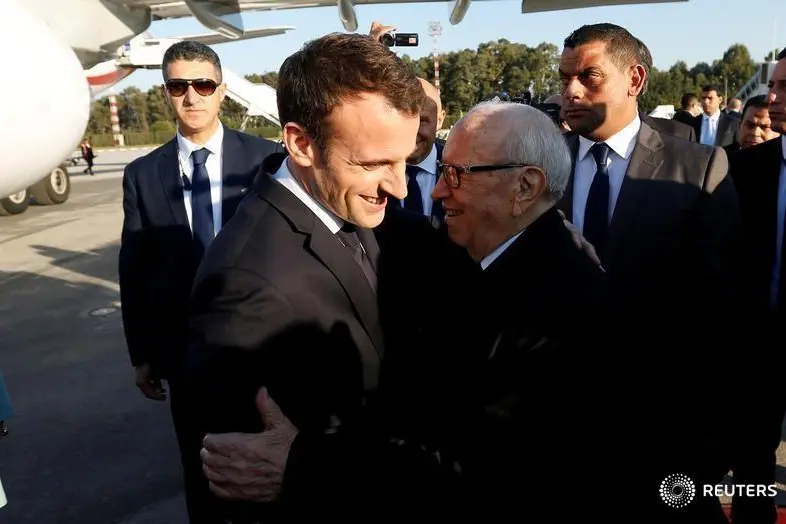PHOTO
TUNIS: France's President Emmanuel Macron said on Thursday he would push to double French investment in Tunisia over five years to buttress its faltering economy and transition to democracy.
In a speech to parliament in Tunis, Macron paid lengthy tribute to Tunisia's 2011 revolution, the first of the Arab Spring uprisings, and to its efforts to build a democratic system, saying they remained an example for a troubled region.
"The challenge which is yours today is to transform this cultural and democratic spring into a political, economic and social spring," that benefited all social classes, he said.
Macron's visit comes less than a month after protests erupted in towns and cities across Tunisia, triggered by price and tax hikes.
Though Tunisia has won praise for political compromises and a 2014 democratic constitution, successive governments have failed to resolve deep economic and social problems including high youth unemployment and marginalisation in the country's interior.
Activists say some democratic freedoms appear to have been eroded, criticising mass arrests carried out during the recent demonstrations.
As Macron visited, protesters calling for jobs brought all production in the country's declining phosphate industry to a halt by staging sit-ins at plants, an official said.
Macron told lawmakers they had a "vast responsibility" to ensure that "nothing that has been undertaken in the last few years is weakened or overturned".
Holding delayed local elections, fighting corruption and reforming public services were all crucial to bolster democracy, he added.
"The Arab world, the Maghreb, all the shores of the Mediterranean are watching you. They are watching you work and they need to see you succeed."
To support job creation, France aimed to double the rate of private sector investment over the five years of Macron's term, which ends in 2022.
"A number of companies have already confirmed their willingness to invest," Macron said, without naming any.
French direct investment in Tunisia was worth 3.3 billion dinars ($1.39 billion) in 2016, making it the second biggest foreign investor behind the United Arab Emirates, according to figures from the French economy ministry.
Macron had pledged more than 270 million euros ($335 million) in new financing for Tunisia on Wednesday, as he began his two-day state visit.
In his speech to parliament, Macron also said France would put all its energy into finding a solution to the conflict in neighbouring Libya and would push for elections to be held there by the end of the year.
(Writing by Aidan Lewis; Editing by Andrew Roche) ((Aidan.Lewis@thomsonreuters.com ; +216-29850352;))
In a speech to parliament in Tunis, Macron paid lengthy tribute to Tunisia's 2011 revolution, the first of the Arab Spring uprisings, and to its efforts to build a democratic system, saying they remained an example for a troubled region.
"The challenge which is yours today is to transform this cultural and democratic spring into a political, economic and social spring," that benefited all social classes, he said.
Macron's visit comes less than a month after protests erupted in towns and cities across Tunisia, triggered by price and tax hikes.
Though Tunisia has won praise for political compromises and a 2014 democratic constitution, successive governments have failed to resolve deep economic and social problems including high youth unemployment and marginalisation in the country's interior.
Activists say some democratic freedoms appear to have been eroded, criticising mass arrests carried out during the recent demonstrations.
As Macron visited, protesters calling for jobs brought all production in the country's declining phosphate industry to a halt by staging sit-ins at plants, an official said.
Macron told lawmakers they had a "vast responsibility" to ensure that "nothing that has been undertaken in the last few years is weakened or overturned".
Holding delayed local elections, fighting corruption and reforming public services were all crucial to bolster democracy, he added.
"The Arab world, the Maghreb, all the shores of the Mediterranean are watching you. They are watching you work and they need to see you succeed."
To support job creation, France aimed to double the rate of private sector investment over the five years of Macron's term, which ends in 2022.
"A number of companies have already confirmed their willingness to invest," Macron said, without naming any.
French direct investment in Tunisia was worth 3.3 billion dinars ($1.39 billion) in 2016, making it the second biggest foreign investor behind the United Arab Emirates, according to figures from the French economy ministry.
Macron had pledged more than 270 million euros ($335 million) in new financing for Tunisia on Wednesday, as he began his two-day state visit.
In his speech to parliament, Macron also said France would put all its energy into finding a solution to the conflict in neighbouring Libya and would push for elections to be held there by the end of the year.
(Writing by Aidan Lewis; Editing by Andrew Roche) ((Aidan.Lewis@thomsonreuters.com ; +216-29850352;))





















